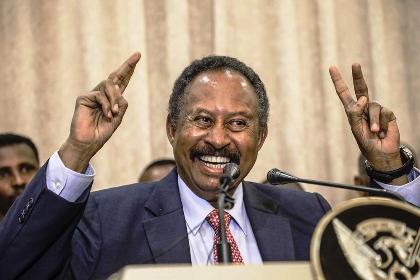Hamdok says he plans to make Sudanese economy productive
August 24, 2019 (KHARTOUM) – Newly appointed Prime Minister Abdallah Hamdok Saturday said he plans to implement structural reforms in the Sudanese economy to transform it from an economy of consumption and imports to a productive one, adding that this economic growth cannot be achieved without ending the war first.

The Sudanese economist was picked by the Forces for Freedom and Change to lead the technocrat transitional government to achieve peace, bring Sudan out of the economic crisis and bring the country back to the international community after being classified as a pariah state.
In his one hour TV interview aired by all the Sudanese and some Arab channels, the prime minister said that the economic crisis can be resolved through addressing its root causes starting by ending the wars in Darfur and the Two Areas.
He stresses that ending the war will allow the government to use some 70% of the expenditure in the national budget, and invest it in development projects particularly agricultural projects, and related industries.
He added such projects will standards of living of the poor Sudanese and ensure a basic minimum source of income that can create an internal cycle of economic growth.
According to Hamdok, the agricultural sector should be the main pillar of the national economy and all the heavy taxes should be repealed after saying that there are 17 taxes only on the export of agricultural products.
Also, he said would ban the exportation of products as raw materials, pointing out that the processing of these products create added value but also create jobs and increase national income.
International Financial Institutions
In a separate interview with Reuters, Hamdok said that Sudan needs $8 billion in foreign aid over the next two years to cover its import bill and help rebuild its ravaged economy.
Further, he underscored that additional $2 billion of foreign reserves deposits were needed to halt a fall in the currency in the next three months.
In his TV interview, the prime minister sought to reassure Sudanese about his government relations with the International Monetary Fund (IMF) and the World Bank (WB) saying that they would not impose their tough receipts if we are seriously implementing reforms.
“No one understands our economy better than us and we can develop a recipe to address our issues and persuade the IMF and WP to deal with us accordingly,” he said citing the Ethiopian experience.
“There is nothing to fear from these organizations,” he stressed.
Hamdok was referring to the harsh austerity reforms al-Bashir government was implementing on the recommendation of the two financial institutions.
In addition, he pointed to the need to fight corruption and reform the banking system in Sudan.
He told Reuters that he started discussions with the IMF and the WB over ways to restructure Sudan’s crippling debt, and approached friendly nations and funding bodies about the aid, without elaborating.
He is expected to announce his government next week and to hold his first cabinet meeting on Sunday 1 September.
(ST)
